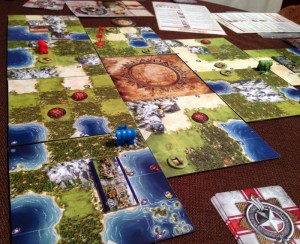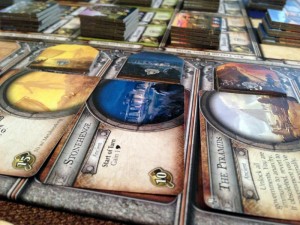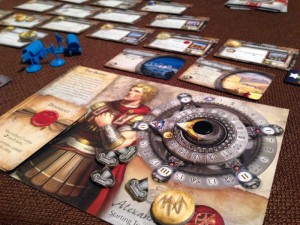 Build an empire to stand the test of time. That was the tag line that accompanied the Civilization computer games that have been played on our computers for over 2 decades. There is no doubt as to the success of the Civilization franchise by Sid Meier. It’s fun, engaging and addictive.
Build an empire to stand the test of time. That was the tag line that accompanied the Civilization computer games that have been played on our computers for over 2 decades. There is no doubt as to the success of the Civilization franchise by Sid Meier. It’s fun, engaging and addictive.
In 2010, Fantasy Flight Games decided to take their stab at the empire building genre and brought their translation of this classic computer game to the tabletop. Is it possible to take a game with so much depth and strategy and create an enjoyable experience on your gaming table? If anyone can do it, Fantasy Flight Games can, read on to find out.
Sid Meier’s Civilization: The Board Game is a empire building board game for 2-4 players (5 with the Fame and Fortune expansion). The game plays in about 2-4 hours depending on the number of players and their experience with the game. We’ve found the game plays well with any number of those players.
Game Overview:

Civilization is an empire/civilization building game where each player starts out with just one city and a couple of units and must work to expand their meager beginnings into a thriving civilization. Each player will start with one of a number of different civilization choices, each of which has their own strengths and advantage towards achieving of the 4 victory conditions.
Players will upgrade their city and units, explore the map, fight and negotiate with other players all in the hopes of being the greatest civilization in the world. Much like in the computer game, there are 4 different ways to win. Players can win by either researching space flight (tech victory), advancing to the end of the culture track (cultural victory), collecting 15 coins (economic victory) or conquering another player’s capitol (military victory). The first player to achieve one of those will walk home the winner.
Components:
As with any game produced by Fantasy Flight Games, you get a high quality product. The Civilization box comes loaded with tokens, map tiles, cards, plastic units and other components that you might expect. The game comes with 6 different civilizations to choose from, each with their own unique abilities. For the most part, each of these felt pretty balanced so there shouldn’t be any fighting for one particular choice. It was an interesting choice to only include 4 different colored miniatures and tokens, instead of one set for each Civilization. I’m sure they did it as a cost saving move, but it would have been nice to see each tailored to a specific civilization.
My main gripe would probably be with the civilization sheets. They feel a little flimsy for the amount of use they will be getting used. Being made of a heavy card stock, I think they might bend or fold with repeated use. Not a huge issue, but something to be aware of. Other than that, everything you get in the box will make you happy…and take up a lot of table space (more on that later).
How To Play:

Civilization comes with an extensive 32 page rule book. If you want to know the full details of how to play, you can download the rules here. But to get you going, turns are as follows.
Once each player has their starting civ and the map is setup, it’s time to begin. I should also note that depending on the number of players, the game map will be setup differently. Less players will use less tiles. Each player will found their capitol city on their starting tile. The rest of the tiles are face down to represent the “fog of war”. Those will be explored on a player’s turn. Each turn will have the following 5 phases, starting with the person with the start player token.
1. Start of turn
- Move the start token clockwise to the next player
- Build a city – A player can found a city by replacing their scout token with a city tile. There are rules that have to be followed, but basically the city must have a full 8 squares available around it. Players can only have two cities until the research the irrigation tech, which gives them access to a third.
- Change government – If a player has researched a new form of government, they can switch to it now.
2. Trade
- Income – Each players gains trade currency based on the amount of symbols in the outskirts of their city. Trade has a few uses, the main one being used to pay for researching new technology.
- Trade with players – Players can negotiate and trade with other players. This can include promises, resources, blackmail, etc…
3. City Management (choose one of the three per city)
- Produce a Unit, Building or Wonder – Each player will have a number of hammer symbols in the outskirts of their city. They can spend these now to buy buildings, army unites, scouts, wonders, etc… Only 1 purchase per city and a player’s hammers aren’t saved from turn to turn. So use them or lose them.
- Devote to the arts – This lets a player gain culture from the city. They use their culture tokens to advance on the culture track (and thus towards the cultural victory). This may also lead to great person appearing or culture cards.
- Harvest Resources – If the player doesn’t want to do any of the other actions then they can harvest a resource from their city’s outskirts. Resources are mainly used to power special abilities on a civilization’s tech card.

- Move – Each player can move all their figures on the map. Figures start with 2 squares of movement, but that can be increased with technology upgrades. If they move to an unexplored map tile, they can spend 1 move point to flip it over and reveal more of the world.
Combat – If an army unit ever moves into a barbarian village or another player’s city, then combat will occur. Combat is a bit odd and one of the more unpopular features of the game.- Combat doesn’t happen with dice rolling, but with cards. Each player draws a specific number of cards from their combat deck (cards will have been purchased in the city management phase) Each card will either be an infantry, cavalry, artillery or airplane (once researched). Each card has 4 sides with different power values. As you upgrade your unites, a card will use the higher power values.
- Cards are played one at a time, either facing opponents cards are next to them. Facing cards will do damage to each other and if a card takes damage equal to it’s power, it dies and is removed. There is also a rock/paper/scissor mechanic where each card will trump a different one. This allows the trump card to do damage first. If it kills the defending card, the defender wont be able to counter attack with it.
- Once all the cards have been played, whoever has the highest strength left is the winner and claims the spoils. Strength is determined by power on combat cards and other misc bonuses (such as from city walls, army tokens and technology).
5. Research
- Players can now spend their trade points to research new technology. There are 5 levels of technology in the game, with the 5th being space flight (and the technological victory). When buying a new tech card, a player must have both enough trade points to pay for it and a place for it to be played. The tech cards form a pyramid so a level 2 tech is played above two level 1 cards. This way earlier technology will form a foundation for later ones. I also should note that when a player buys a tech card, they have to spend all of their trade points. This makes players research technology early in the game as they won’t want to waste a massive amount of trade points on a level 1 tech card later in the game. Players may keep trade 1 point for each coin they have. So if you have 5 coins, you’ll be able to save 5 trade points after a tech purchase.
That’s the basic flow of the turn. It may seem like there is a lot going on, and there is, but after a few rounds of play things will normalize. Fantasy Flight did a good job of making the game not feel too overwhelming. They had to simplify some things down, but it helped to keep the game flow moving.
Turns will continue in this matter until one of the 4 victory conditions have been met.

Game Experience:
Still with me? I know that’s a lot to digest, but it’s not as rough as it sounds. Building an empire has a lot of moving parts and a leader’s job is never done. I think the first few rounds are probably the hardest in Civilization. I would not be surprised if a new player felt a bit overwhelmed. I’d say it probably takes a good 10-20 minutes for rules explanation and it’s really not until a couple of turns have passed that a player will have a good feel for the game.
But once you get past that point, you have a great game on your hands. There will always be a lot to do in a civilization building game. Between exploring, fighting, researching and building, you will never be looking for things to do on your turn. In our games, our turns actually flowed surprisingly well. Once players got a feel for the game, the were able to start working on their strategy.
And that’s one of the things I love about Civilization. All the players will play the game a little bit different. A lot of games have a single goal and everyone is racing towards it. In Civilization, players may be competing for the same goal, or they might shift gears and try for a different one. I love the options and it really helps the replay value of the game. Between the different win conditions and the different civilization choices, each game of Civilization should play different than any other.

One thing I should note about the game is that it’s a huge table hog. We had a 3 player game where there wasn’t an ounce of table real estate left. To add in the 4th player, I probably would have had to put the leaf in the table. Even the two player game will take up a good amount of table space, especially when the tech pyramid starts to grow. So that’s something to be aware of if you have a small gaming table.
Long time fans of the computer game might also notice some differences in the board game. I think the main difference is the streamlining of city management. The early versions of the Civilization computer game required a lot of micromanagement of a player’s cities. Some of that was taken care of in the later games as players could focus more on running their empire. The same holds true in the board game. While players will still be building structures in their cities, only one will be built a turn. And that’s about all the city management a player has to do. No more keeping the people happy or more moving workers around the city improving the land. More time will be spent on exploring and building their empire then being a mayor.
Speaking of, I must say I’m not a huge fan of how the combat system works. It’s not a bad system, it just feels a little weird. I think I’d rather they had gone with the standard “lots of minis and lots of dice rolling.” I will admit that the card system does make battles go by quickly, it’s just not a very satisfying experience. Then there is the fact that you are drawing random units from your army deck at the start of the battle, so you will be conducting attacks not even knowing what you will have to attack with. It’s not hard to see why many players don’t care for the battle system. For me, it doesn’t ruin the game, it’s just something I wish they had done differently. I hear rumblings that they will be tweaking the battle system in the upcoming Wisdom and Warfare expansion.

But those complaints aside, Civilization is still a fantastic game. I feel like they took the spirit of the computer game and boiled it down to its essence. Working your way up the tech tree is a lot of fun, and there are more techs then you will even be able to build in a single game. That gives each civilization a different way to customize their empire. Combine that with the unique abilities of each specific civilization and you have a game with a lot of replay value where everyone is a little unique.
The other thing to be aware of is the play time. This is a heavy game. You will be going for a minimum of 2 hours and that’s if everyone is experienced with the game. New players that are learning the rules or someone prone to analysis paralysis will draw out the play time. This is a game to build your game night around. And that’s OK. Playing Civilization is a extremely rewarding experience and a great way to spend a few hours. With the 4 different ways to win, there are a lot of different routes to take. I’ve found that in almost everyone one of our games, each player has been in it until the very end. It will usually be in the last turn or two when someone will pull ahead and you can see them make that final mad dash to victory. It’s a great game that can keep everyone engaged for 2+ hours. Time seems to fly by while playing Civilization because there is just so much going on. That’s one of the reasons that Civilization is such a great game.
At the end of the day, you have a extensive civilization building game that flows really well from turn to turn. The turns chug along at a smooth pace and a player has a lot of options where they want to focus their attention each turn. These are all hallmarks of a fantastic game.
Final Thoughts:

What you get with Civilization is about what you might have expected. A game that doesn’t exactly recreate the PC game experience, but takes the essence of it and builds a new game around it. It would have been impossible to completely recreate the PC experience without making a game that takes weeks to play. What you have here is a fantastic civilization/empire building game that should appeal to both fans of the PC game and new comers. I think we have a decent challenger to Through the Ages, known for being one of the best civilization building games on the market.
I’m glad Fantasy Flight didn’t feel compelled to keeping in every aspect of the PC game. Gone is some of the tedious micro management of your cities or unhappy people in your empire. What’s left are some of the things that has made the Civilization series great: Working your way up the tech tree, building armys, upgrading your cities and exploration and expansion.
Despite the flaws in the game, it is still one of my favorite empire building games. I enjoy the diversity in the game and how each one plays differently. If the play time wasn’t so long, I’d probably play Civilization a whole lot more than I do. The fact that Civilization plays equally well with 2, 3 or 4 players is also a positive. There are only a handful of games I can think of that play just as well with 3 players as with 4. We tried Civilization with 3 and it worked perfectly. Not many games can say that.
If you are looking for a fun, well rounding civilization building game, then I think you’ve found something good with Sid Meier’s Civilization: The Board Game. Will your empire be the one left standing when the dust clears? Only time will tell.
If you are interested in getting a copy for yourself, it’s about $45
Final Score: 4 Stars – A great civilization game that takes the essence of the computer game and makes it into an enjoyable tabletop experience.
 Hits:
Hits:
• A lot of options make for high replay value
• Different strategies work for each game
• A lot of solid components
• A must own for fans of the computer game
Misses:
• Combat is a bit odd and abstract
• Won’t work if you have a small table




















